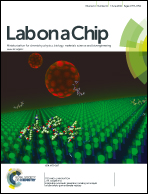A multiple-channel, multiple-assay platform for characterization of full-range shear stress effects on vascular endothelial cells
Abstract
Vascular endothelial cells (VECs), which line blood vessels and are key to understanding pathologies and treatments of various diseases, experience highly variable wall shear stress (WSS) in vivo (1–60 dyn cm−2), imposing numerous effects on physiological and morphological functions. Previous flow-based systems for studying these effects have been limited in range, and comprehensive information on VEC functions at the full spectrum of WSS has not been available yet. To allow rapid characterization of WSS effects, we developed the first multiple channel microfluidic platform that enables a wide range (~15×) of homogeneous WSS conditions while simultaneously allowing trans-monolayer assays, such as permeability and trans-endothelial electrical resistance (TEER) assays, as well as cell morphometry and protein expression assays. Flow velocity/WSS distributions between channels were predicted with COMSOL simulations and verified by measurement using an integrated microflow sensor array. Biomechanical responses of the brain microvascular endothelial cell line bEnd.3 to the full natural spectrum of WSS were investigated with the platform. Under increasing WSS conditions ranging from 0 to 86 dyn cm−2, (1) permeabilities of FITC-conjugated dextran and propidium iodide decreased, respectively, at rates of 4.06 × 10−8 and 6.04 × 10−8 cm s−1 per dyn cm−2; (2) TEER increased at a rate of 0.8 Ω cm2 per dyn cm−2; (3) increased alignment of cells along the flow direction under increasing WSS conditions; and finally (4) increased protein expression of both the tight junction component ZO-1 (~5×) and the efflux transporter P-gp (~6×) was observed at 86 dyn cm−2 compared to static controls via western blot. We conclude that the presented microfluidic platform is a valid approach for comprehensively assaying cell responses to fluidic WSS.


 Please wait while we load your content...
Please wait while we load your content...